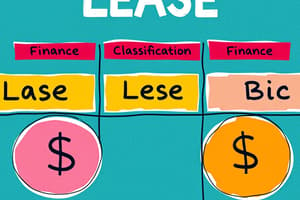Podcast
Questions and Answers
For a lease premium exceeding 50 years, how is the lease premium treated for the lessor?
For a lease premium exceeding 50 years, how is the lease premium treated for the lessor?
- Treated as a capital gain. (correct)
- Treated as taxable income.
- Exempt from taxation.
- Treated as rental income.
If a lessee incurs an expenditure for trade purposes, they can deduct the calculated amount as an expense all in the first year of the lease.
If a lessee incurs an expenditure for trade purposes, they can deduct the calculated amount as an expense all in the first year of the lease.
False (B)
Using the formula P x (1 - (L-1) x 2%), calculate the income element of a lease premium of £200,000 for a 5-year lease.
Using the formula P x (1 - (L-1) x 2%), calculate the income element of a lease premium of £200,000 for a 5-year lease.
£168,000
For a lease of less than or equal to 50 years, income tax will be payable on the amount determined by the formula P x __________.
For a lease of less than or equal to 50 years, income tax will be payable on the amount determined by the formula P x __________.
Match the following lease premium elements with their corresponding formulas:
Match the following lease premium elements with their corresponding formulas:
Flashcards
Lease > 50 years tax?
Lease > 50 years tax?
If a lease is longer than 50 years, the premium is a capital gain for the lessor and not deductible for the lessee.
Lease <= 50 years tax?
Lease <= 50 years tax?
If a lease is 50 years or less, income tax is payable on the premium.
Income element (lessor)?
Income element (lessor)?
The portion of a lease premium treated as rental income for the lessor.
Capital element (lessor)?
Capital element (lessor)?
Signup and view all the flashcards
Lessee's deduction?
Lessee's deduction?
Signup and view all the flashcards
Study Notes
Lease Premia Taxation
- If a lease exceeds 50 years, the lease premium is treated as a capital gain for the lessor.
- For leases over 50 years, the expenditure is disallowable for the lessee.
- If a lease is 50 years or less, income tax applies to the lease premium.
- Lessees can claim an annual equivalent of the lease premium amount, time-apportioned over the lease term.
Lease Premia (Lessor)
- Income element formula: P × (1-(L-1)×2%)
- P = amount of lease premium
- L = life of lease, in years
- Capital element formula: P × (L-1)×2%
- Example with a £100,000 lease premium for a ten-year lease:
- Income element: 100,000 × (1 – 9×2%) = £82,000, deemed rental income
- Capital element: 100,000 × 9×2% = £18,000, treated as capital receipt
Lease Premia (Lessee)
- In the example provided, with a lease premium of £100,000 for a ten-year lease, proceeds include:
- Income element: 100,000 × (1 – 9×2%) = £82,000, treated as property income
- If the lessee incurs the expenditure for trade purposes, they can deduct a calculated amount as an expense.
- This expense is spread over the life of the lease.
- Each year of the lease, the lessee can claim a deduction, calculated as £82,000 ÷ 10 years = £8,200.
Studying That Suits You
Use AI to generate personalized quizzes and flashcards to suit your learning preferences.




